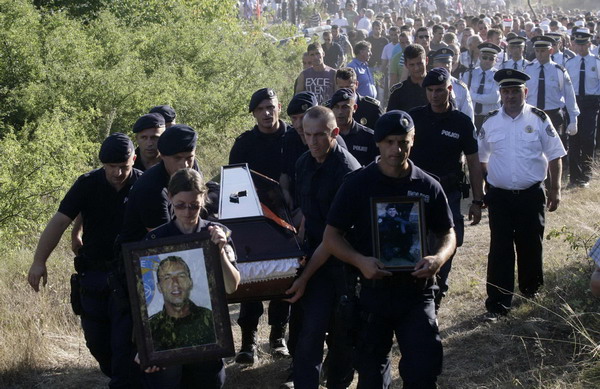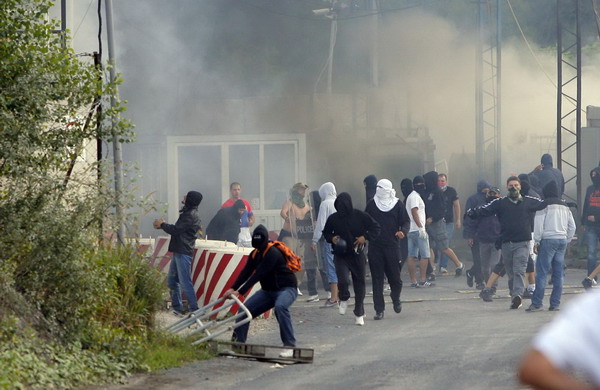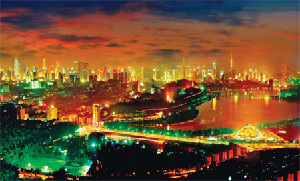Diplomatic and Military Affairs
Violence in north Kosovo draws EU warning
Updated: 2011-07-28 11:22
(Agencies)
|
 Members of the Kosovo special police unit carry the coffin during the funeral of Enver Zymber, a member of the Kosovo special police unit in the village of Dubovc, 20km north of Pristina July 27, 2011. Zymber died on Tuesday after being seriously wounded during a botched attempt by ethnic Albanian Kosovo government forces to take control of two border posts in an ethnic Serb area, police said. [Photo/Agencies]
|
Kosovo, which has a 90 percent ethnic Albanian majority, sent special police units on Monday to take control of northern border crossings and enforce a ban on imports from Serbia - retaliation for its block on Kosovo's exports.
Kosovo declared independence from Serbia in 2008 but Belgrade does not recognise the move and the 60,000 Serbs who live in northern Kosovo still consider Belgrade their capital.
One Kosovo police officer was shot in the head and died on Tuesday in a clash with local Serbs. On Wednesday, armed Serbs attacked and burned down the Jarinje border post and fired at members of NATO's KFOR peacekeeping force.
"It was confirmed that an act of arson was committed against that position... There have also been confirmed reports of shots fired at KFOR personnel in the vicinity," KFOR said in a statement.
It did not say whether anyone was injured in the attack or whether KFOR troops had returned fire, but said reinforcements had been sent to the border.
Kosovo's Prime Minister Hashim Thaci accused Belgrade of masterminding the violence. "We will not withdraw, there will be no return under any circumstances and at any price," he said.
He said Serbia was trying to carve out a piece of northern Kosovo, but this "will never happen".
Serbia's pro-European President Boris Tadic urged Kosovo Serbs to refrain from violence. "The hooligans who are sparking violence are not defending either the people or the Serb state," his office said in a statement.
|
 Masked Serbs set the Serbia-Kosovo border crossing on fire in Jarinje July 27, 2011. Ethnic Serbs set fire to a border crossing post in northern Kosovo on Wednesday after Kosovo's government said it had regained control of that station and one other, officials said. Oliver Ivanovic, Serbia's state secretary for Kosovo, said no one was hurt, but voiced concern about further violence. [Photo/Agencies]
|
"Restore calm immediately"
EU foreign policy chief Catherine Ashton said she spoke on Tuesday with Thaci and Tadic, urging them to restore calm immediately with a warning that violence would not be tolerated.
"I strongly condemn the violence that has taken place in northern Kosovo. These latest developments are unacceptable," she said in a statement.
"It is the responsibility of both Belgrade and Pristina to immediately defuse the tensions, and restore calm and security for everyone."
Belgrade wants to join the EU, but it must mend its ties with Kosovo to speed up its bid to join the bloc. Pristina and Belgrade have started EU-moderated talks aimed at improving trade, movement of people and issues like energy supplies, but negotiations have moved slowly.
Kosovo's police raids on Monday and Tuesday drew criticism from both the United States as the EU, which said the government should have consulted its Western backers.
A Serb eyewitness said on Wednesday that a group of masked men armed with wooden planks, axes and crowbars attacked and burned the Jarinje border post, which consisted of two-storey prefabricated buildings and a roofed passageway for cars.
"Later a bulldozer was brought to demolish the burned buildings," he said.
A cameraman and a sound engineer of Serbia's state-run Tanjug news agency were attacked by Serb hardline nationalists near Jarinje and seriously injured, the agency said.
In a separate incident earlier on Wednesday, an unidentified gunman fired shots at a NATO helicopter, a NATO spokesman said, but there were no injuries.
The UN Security Council accepted a Serbian request for an urgent meeting on tensions in Kosovo after Serbia sent a letter to the 15-nation council requesting an open meeting.
The call was supported by Serbia's ally Russia, which like Belgrade has refused to recognize Kosovo's February 2008 declaration of independence from Serbia.
The council opted for a compromise and scheduled closed-door consultations on Kosovo on Thursday, rather than a public meeting, the diplomats told Reuters on condition of anonymity.
Serbia lost its former province of Kosovo in 1999, when NATO waged a bombing campaign to stop Yugoslav leader Slobodan Milosevic from killing ethnic Albanians and carrying out ethnic cleansing in a counter-insurgency war.
E-paper

Ringing success
Domestic firms make hay as shopping spree by middle class consumers keeps cash registers ringing in Nanjing
Mixed Results
Crowning achievement
Living happily ever after
Specials

Ciao, Yao
Yao Ming announced his retirement from basketball, staging an emotional end to a glorious career.

Going the distance
British fitness coach comes to terms with tragedy through life changes

Turning up the heat
Traditional Chinese medicine using moxa, or mugwort herb, is once again becoming fashionable
